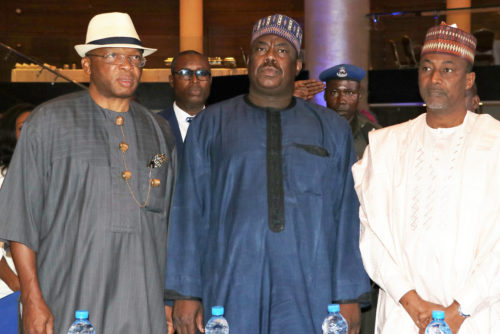
The Secretary to the Government of the Federation (SGF), Boss Mustapha on Tuesday said Nigeria’s port concession regime has yielded positive dividends for the country as private terminal operators – otherwise known as concessionaires – employed 48,000 workers within the first six years of their operation.
Speaking in Lagos at an event to mark the 2018 World Maritime Day with the theme “IMO 70: Our Heritage – Better Shipping for a Better Future”, the SGF said, “It was reported that within six years of the port concession, private operators had employed over 48,000 Nigerians against a little over 14,000 before the policy shift. These are, of course, notable achievements, which we need to consolidate further.”
The SFG, who was represented by the Minister of State for Works, Power and Housing, Mustapha Baba Shehuri, said contrary to insinuations, the Federal Government was not taking the issue of safety and security in the maritime sector lightly.
He said, “Like the proverbial goose that lays the golden egg, the maritime industry must be protected to attract foreign investors and also preserve Nigeria’s territorial integrity. Permit me to commend the Federal Ministry of Transportation for confronting the matter with the seriousness it deserves.”
He said in spite of its numerous achievements, the maritime industry in Nigeria and indeed globally has come under siege by criminal elements who orchestrate acts of piracy, sea robbery and arm proliferation in the Gulf of Guinea and within Nigeria’s territorial waters. He said due to these challenges, the gains recorded through dredging, amnesty and port concession exercises in Nigeria nosedived, thus compelling some foreign shipping companies to enter Nigeria’s territorial waters with armed security personnel on board.
He, however, assured of the Federal Government’s commitment towards improving security of the nation’s maritime domain.
“I am aware that a contract has been awarded for the Integrated National Security and Water Protection Infrastructure in Nigeria under the Deep Blue Project.
“This project entails the provision of security infrastructure and the training of personnel for the protection of Nigeria’s maritime domain. It is envisaged that this project will comprehensively address the emerging cases of insecurity in the maritime industry and restore investors’ confidence.
“The treasures for our future growth and development lie in an improved shipping environment where safety and security of goods, services, seafarers and the shipping community as a whole is guaranteed.
“The lMO has been resolute in evolving strategies to facilitate efficient shipping and member countries should cultivate the benefits of the blue economy concept through creativity, innovativeness and collaboration,” he said.
Mustapha noted that maritime crime is an organized one having its elements all over world, hence the need for the Nigerian government to drum support for regional and sub-regional collaboration that would ensure integrated maritime security strategies in addressing the challenges of insecurity.
In his opening remarks, the Minister of Transportation, Rotimi Amaechi, said concerted efforts were being made by government to strengthen the institutional capabilities of agencies responsible for providing maritime security in Nigeria’s maritime domain and around the Gulf of Guinea region.
The Minister, who was represented by the Permanent Secretary of the Federal Ministry of Transportation, Sabiu Zakari, said the Federal Executive Council (FEC) recently approved the procurement of new security architecture for the Nigerian Maritime Administration and Safety Agency (NIMASA), which involves the acquisition of new platforms and other logistics required to enable the agency perform its statutory functions of securing Nigerian waters in conjunction with the Nigerian Navy.
“The importance of ensuring a safe maritime domain cannot be overemphasized. A safe, secure and efficient shipping industry will surely revitalize and diversify the economy of Nigeria away from crude oil exploration to a maritime hub.
“Therefore, the promotion of sustainable shipping and sustainable maritime development as expressed in the theme of this year’s celebration will stimulate the development of new technologies and innovation, agile maritime security platforms and the development of the maritime infrastructure,” he said.